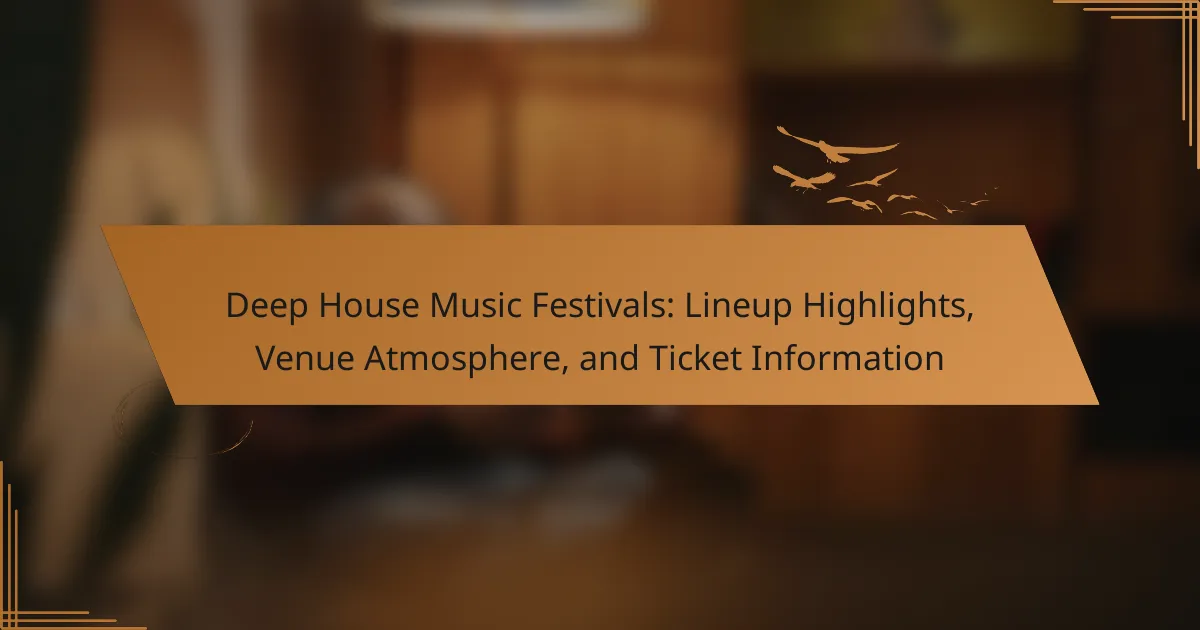Deep House Music Festivals are dedicated events that celebrate the genre of deep house music, featuring a lineup of multiple artists and DJs performing deep house sets. These festivals create immersive experiences in various venues, combining music, art, and social interaction, often accompanied by food vendors and workshops. Key highlights include renowned DJs such as Black Coffee, Solomun, and Dixon, alongside emerging talents, fostering a dynamic musical atmosphere. The venue’s design significantly enhances sound quality and attendee engagement, while ticket information, pricing, and entry requirements are crucial for potential attendees to understand before participating in these vibrant cultural gatherings.
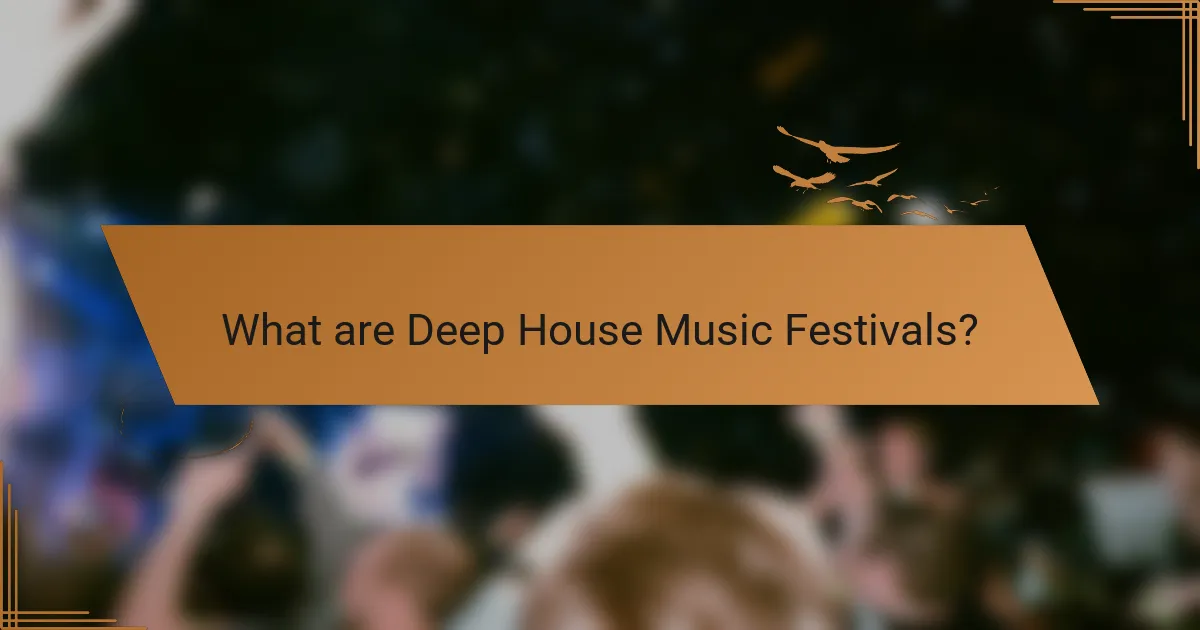
What are Deep House Music Festivals?
Deep House Music Festivals are events dedicated to the genre of deep house music. These festivals feature multiple artists and DJs who perform deep house sets. They typically take place in outdoor or indoor venues, creating an immersive atmosphere. Attendees enjoy a blend of music, art, and social interaction. Festivals often include food vendors, art installations, and workshops. Popular deep house festivals attract large crowds and showcase both established and emerging talent. Examples of such festivals include Amsterdam Dance Event and Sonus Festival. These events celebrate the deep house culture and community.
How did Deep House Music Festivals evolve over time?
Deep House Music Festivals evolved significantly since their inception in the 1980s. Initially, they were small, underground gatherings focused on niche audiences. As the genre gained popularity, festivals began to attract larger crowds. By the 1990s, notable events like the Detroit Electronic Music Festival emerged, showcasing deep house artists. The 2000s saw a surge in international festivals, expanding the genre’s reach. Major cities hosted large-scale events, blending deep house with other electronic music styles. Today, festivals feature diverse lineups, immersive experiences, and elaborate production. This evolution reflects the genre’s growing mainstream acceptance and cultural significance.
What are the historical roots of deep house music?
Deep house music originated in the 1980s as a subgenre of house music. It emerged from the Chicago house scene, influenced by disco and jazz. Key figures like Larry Heard and Frankie Knuckles played significant roles in its development. Deep house is characterized by its soulful vocals and complex melodies. The genre gained popularity in the 1990s, particularly in Europe. It became associated with the underground club culture. The use of synthesizers and electronic instruments defined its sound. Today, deep house continues to evolve while maintaining its roots in soulful and melodic elements.
How have festival formats changed in recent years?
Festival formats have evolved significantly in recent years. Many festivals have shifted towards multi-day events to enhance attendee experience. The incorporation of diverse genres beyond deep house has broadened audience appeal. Technology has transformed formats, with virtual and hybrid options becoming more prevalent. Festivals now emphasize sustainability, implementing eco-friendly practices. Additionally, smaller, boutique festivals have gained popularity, offering intimate settings. Enhanced VIP experiences and exclusive access have become common features. These changes reflect a response to evolving audience preferences and the impact of global events.
What makes Deep House Music Festivals unique?
Deep House Music Festivals are unique due to their distinct musical style and immersive experiences. They focus on deep, soulful beats that create a relaxed atmosphere. The festivals often feature a lineup of renowned and emerging artists in the deep house genre. This genre emphasizes melody and rhythm, attracting a dedicated fan base.
The venue atmosphere is typically intimate, enhancing the connection between artists and attendees. Many festivals are held in scenic outdoor locations, adding to the overall experience. The community vibe fosters interaction and collaboration among festival-goers.
Additionally, deep house festivals often incorporate art installations and visual experiences, further enriching the environment. This combination of music, atmosphere, and community sets deep house music festivals apart from other music events.
What are the defining characteristics of deep house music?
Deep house music is characterized by its smooth, soulful sound and deep basslines. It typically features slower tempos, usually ranging from 120 to 125 beats per minute. The use of complex chords and jazzy elements is common in deep house tracks. Vocals, when present, are often mellow and atmospheric. Deep house incorporates ambient sounds, creating a relaxed vibe. It emerged in the 1980s, influenced by Chicago house and jazz-funk. The genre is known for its emphasis on rhythm and groove. Notable artists include Larry Heard and Kerri Chandler, who helped define its sound.
How do deep house festivals differ from other music festivals?
Deep house festivals differ from other music festivals primarily in their musical focus and atmosphere. They emphasize deep house music, characterized by its soulful and melodic elements. This genre often features slower tempos and a more laid-back vibe compared to mainstream electronic dance music.
The audience at deep house festivals tends to seek a more immersive experience. This contrasts with the high-energy environments typically found at other music festivals. Additionally, deep house festivals often prioritize intimate settings and unique venues. These can include beach locations, warehouses, or outdoor gardens, fostering a sense of community among attendees.
Moreover, the lineup at deep house festivals usually showcases a blend of well-known and underground artists. This differs from larger festivals that may focus on mainstream acts. The overall experience at deep house festivals is often more about connection and ambiance rather than just the music.
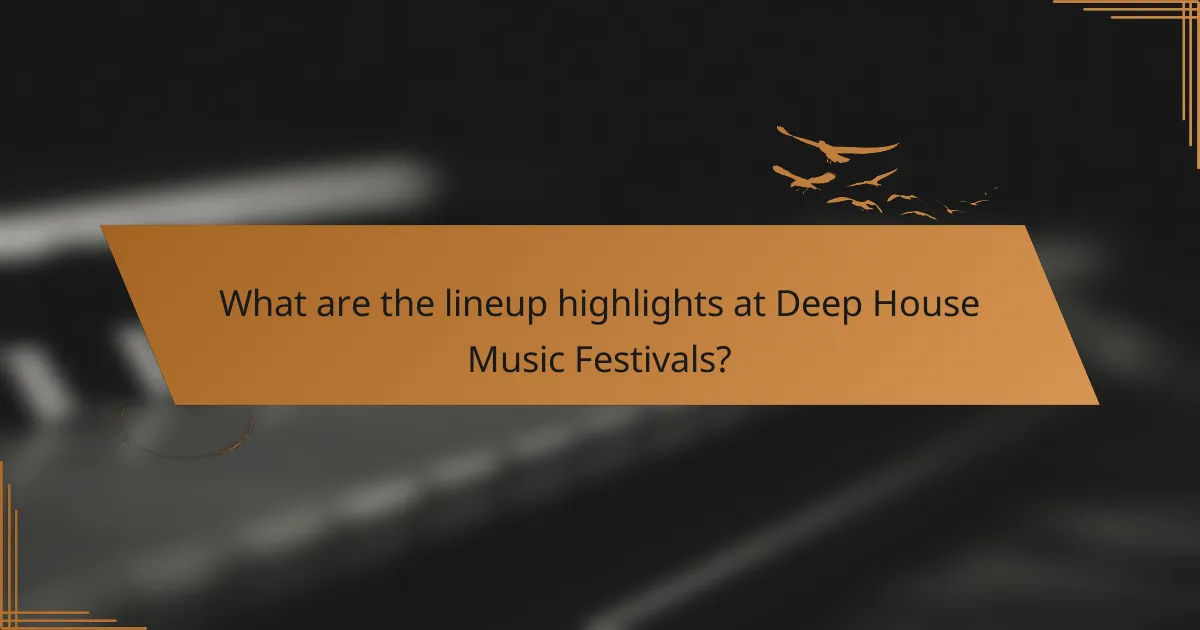
What are the lineup highlights at Deep House Music Festivals?
Lineup highlights at Deep House Music Festivals typically include renowned DJs and emerging artists. These festivals often feature headliners known for their deep, soulful sounds. Lineups may include artists like Black Coffee, Solomun, and Dixon. Emerging talents are also showcased, providing a platform for new voices in the genre. Festivals often curate diverse stages to enhance the experience. The blend of established and new artists creates a dynamic atmosphere. Many festivals also focus on unique collaborations and back-to-back sets. This approach keeps the musical experience fresh and engaging for attendees.
Who are the top artists featured in deep house lineups?
Top artists featured in deep house lineups include Black Coffee, Solomun, and Dixon. Black Coffee is known for his unique sound and has gained international acclaim. Solomun has a reputation for his energetic sets and has headlined major festivals. Dixon is celebrated for his deep, melodic style and has a loyal following. Other notable artists include Jamie Jones, Tale Of Us, and Âme. These artists are frequently booked for prominent deep house festivals worldwide. Their presence often elevates the festival experience and attracts large crowds.
What criteria are used to select artists for these festivals?
Artists for deep house music festivals are selected based on several criteria. These include musical style, audience appeal, and previous performance history. Festivals prioritize artists who align with the deep house genre. They also consider the artist’s ability to attract a crowd. Emerging talents may be featured alongside established names. Additionally, the artist’s social media presence can influence selection. Festivals often seek diversity in their lineups to enhance the experience. Collaborations and unique performances are also valued. Overall, selection aims to create a balanced and engaging festival atmosphere.
How do emerging artists get opportunities at these events?
Emerging artists get opportunities at deep house music festivals through various channels. They often submit demo tracks to festival organizers for consideration. Many festivals have open calls for artists to apply for slots. Networking within the music community increases visibility for these artists. Collaborations with established artists can also lead to festival bookings. Additionally, social media presence helps in gaining attention from festival curators. Some festivals prioritize local talent, providing platforms for nearby emerging artists. These processes create pathways for new artists to showcase their work at significant events.
What are the typical performance styles at Deep House Music Festivals?
Typical performance styles at Deep House Music Festivals include live DJ sets and performances by electronic music artists. DJs often blend tracks seamlessly, creating a continuous flow of music. Live performances may feature vocalists and instrumentalists, enhancing the overall experience. Artists typically focus on deep basslines and melodic elements. The atmosphere is often immersive, encouraging audience interaction. Visual elements like light shows complement the music, enhancing the vibe. Many performances emphasize improvisation, allowing artists to adapt to the crowd’s energy. This dynamic interaction is a hallmark of deep house music festivals.
How do DJs and live performers create their sets?
DJs and live performers create their sets by selecting and arranging music tracks to engage the audience. They often start by understanding the event’s atmosphere and audience preferences. DJs use software or hardware to mix tracks seamlessly. They incorporate beat matching and key matching techniques to ensure smooth transitions. Live performers may play instruments or use vocal performances alongside pre-recorded tracks. They often build their sets dynamically, reacting to the crowd’s energy. This approach can include improvisation and live remixing. Many DJs also draw from a library of original tracks and remixes to enhance their sets. Their goal is to create a memorable experience that resonates with the audience throughout the performance.
What role does audience interaction play in performances?
Audience interaction enhances performances by creating a dynamic connection between artists and attendees. This engagement fosters a sense of community among festival-goers. Active participation can elevate the energy of the performance. Research shows that interactive experiences lead to higher levels of audience satisfaction. For instance, a study by the University of Southern California found that audience involvement increases enjoyment and emotional response. Additionally, interactive elements can encourage spontaneous moments, making each performance unique. This interaction often results in memorable experiences that resonate long after the event.
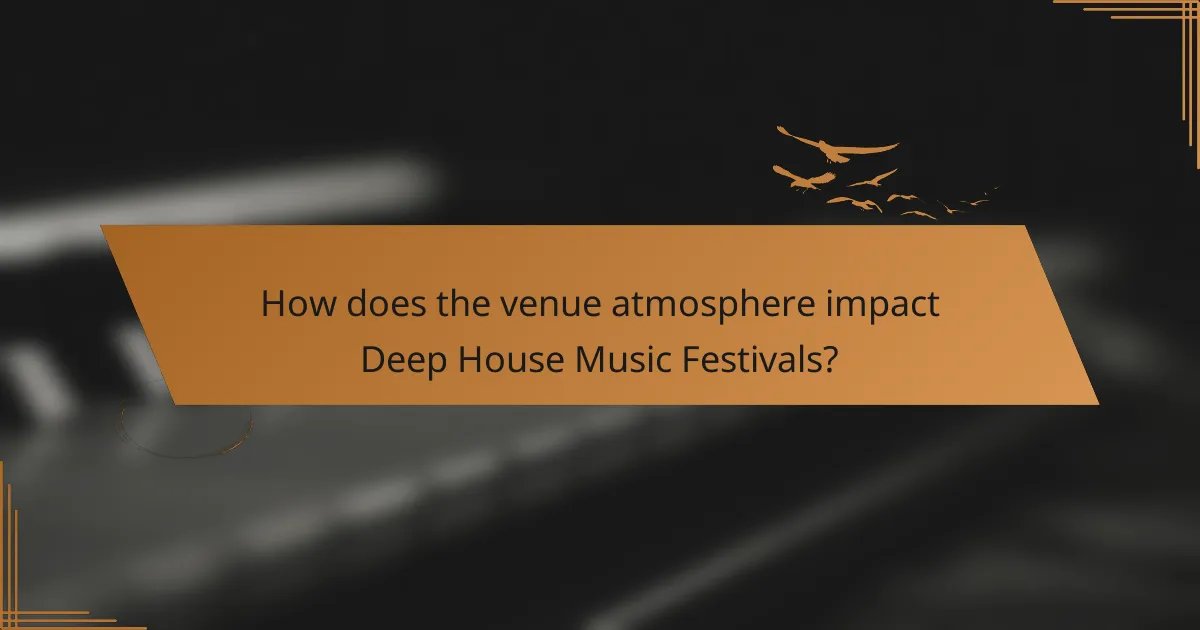
How does the venue atmosphere impact Deep House Music Festivals?
The venue atmosphere significantly impacts Deep House Music Festivals by shaping the overall experience for attendees. A well-designed venue enhances sound quality and acoustics. This creates an immersive environment that complements the music’s deep, resonant beats. Outdoor venues with natural surroundings can foster a sense of connection to nature. Research indicates that positive venue aesthetics can elevate mood and enjoyment levels. Additionally, the layout influences crowd interaction and energy flow. Venues with open spaces encourage socialization, enhancing the communal aspect of the festival. Ultimately, the atmosphere directly affects attendee satisfaction and engagement.
What types of venues host deep house music festivals?
Deep house music festivals are typically hosted in various types of venues. Common venues include outdoor parks and open-air spaces. These locations often provide a vibrant atmosphere for large crowds. Indoor nightclubs are also popular, offering an intimate setting for attendees. Warehouses are frequently transformed into festival spaces, enhancing the underground vibe. Beachfront locations attract festivals for their scenic views and relaxed ambiance. Additionally, urban rooftops are used for smaller events, providing a unique skyline backdrop. Each venue type contributes to the overall experience of deep house music festivals.
What are the benefits of outdoor versus indoor venues?
Outdoor venues provide natural ambiance and space for larger crowds. They often enhance the festival experience with scenic views and fresh air. Additionally, outdoor settings can foster a more relaxed atmosphere. In contrast, indoor venues offer climate control and protection from weather elements. This ensures comfort for attendees regardless of external conditions. Indoor venues also tend to have better acoustics, enhancing sound quality. According to a study by Eventbrite, 68% of festival-goers prefer outdoor venues for their vibrant atmosphere. Meanwhile, indoor venues can facilitate more intimate performances, appealing to different audience preferences.
How does venue design enhance the festival experience?
Venue design enhances the festival experience by creating an immersive environment for attendees. Thoughtfully designed spaces facilitate social interactions and community building. For example, open layouts encourage mingling and networking among festival-goers. Effective use of lighting and sound systems elevates the auditory and visual experience. The arrangement of stages, food vendors, and rest areas impacts attendee flow and comfort. According to a study by the University of California, venue aesthetics significantly influence overall satisfaction at events. Well-planned venues can also accommodate larger crowds while maintaining safety and accessibility. Ultimately, venue design plays a crucial role in shaping memorable festival experiences.
How does the atmosphere contribute to the overall experience?
The atmosphere significantly enhances the overall experience at deep house music festivals. A vibrant atmosphere fosters connection among attendees. It encourages emotional engagement with the music. Elements like lighting, decor, and crowd energy shape this atmosphere. According to a study by the Journal of Environmental Psychology, immersive environments increase enjoyment and satisfaction. This suggests that a well-crafted atmosphere leads to memorable experiences. The synergy between music and setting amplifies the festival’s impact on attendees. Overall, the atmosphere is a crucial component of the festival experience.
What elements create a vibrant atmosphere at these festivals?
A vibrant atmosphere at deep house music festivals is created by several key elements. The music selection plays a crucial role. Renowned DJs and live acts contribute to an engaging auditory experience. High-quality sound systems enhance the clarity and impact of the music. Visual elements, such as lighting and stage design, create an immersive environment. Interactive art installations encourage attendee participation. Diverse food and beverage options cater to various tastes and preferences. Community engagement fosters a sense of belonging among festival-goers. These elements collectively enhance the overall festival experience, making it memorable and enjoyable.
How do lighting and sound design influence festival vibes?
Lighting and sound design significantly shape the atmosphere of festivals. Effective lighting creates visual stimulation that enhances emotional responses. For example, synchronized light shows can elevate excitement and engagement among attendees. Sound design, including quality and genre-specific audio, influences the overall experience. Deep house music festivals often utilize deep bass and melodic elements to create immersive environments. Research indicates that well-designed soundscapes can increase audience satisfaction and prolong attendance. Together, these elements foster a unique vibe that resonates with festival-goers, making the event memorable.
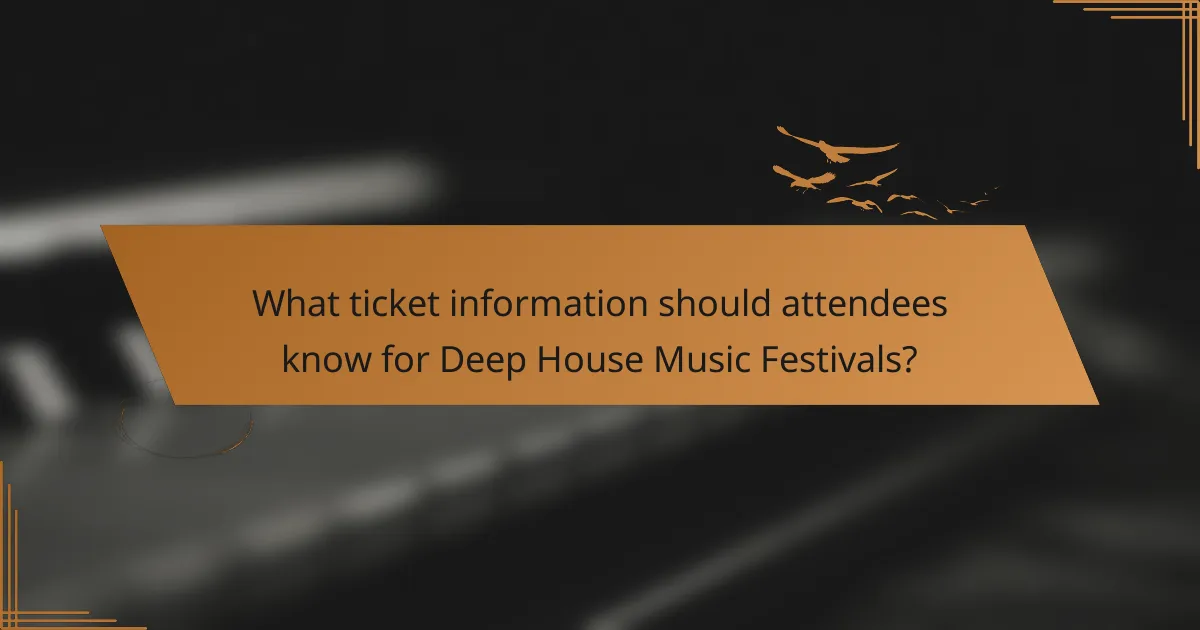
What ticket information should attendees know for Deep House Music Festivals?
Attendees should know the ticket prices, purchase methods, and entry requirements for Deep House Music Festivals. Ticket prices can vary widely based on the festival’s location and lineup. Early bird tickets often offer discounts. Attendees can usually purchase tickets online through official festival websites or authorized vendors. Some festivals may offer tiered pricing for different experiences, such as VIP access. It’s important to check the festival’s refund policy in case of cancellations. Attendees should also be aware of age restrictions, as some events may be [censured] or 21+. Lastly, attendees should confirm the festival’s entry requirements, including any necessary identification or health guidelines.
What are the common ticket pricing structures?
Common ticket pricing structures include tiered pricing, early bird pricing, and VIP packages. Tiered pricing offers different price levels based on seating location or access level. Early bird pricing provides discounts for those who purchase tickets well in advance. VIP packages typically include premium benefits such as exclusive access, merchandise, or hospitality options. These structures help attract a diverse audience and maximize revenue. For instance, early bird tickets can be up to 30% cheaper than regular prices. This pricing strategy encourages early sales and helps organizers gauge interest.
How do early bird tickets compare to last-minute purchases?
Early bird tickets are typically cheaper than last-minute purchases. Early bird options often offer significant discounts, sometimes up to 30% off the regular price. This pricing strategy incentivizes attendees to commit early, aiding event organizers in planning. Conversely, last-minute purchases tend to be more expensive due to limited availability and increased demand as the event date approaches. Statistics show that prices can rise dramatically, sometimes exceeding the original price by 50% or more. Therefore, purchasing early bird tickets is financially advantageous for festival-goers.
What additional fees should attendees be aware of?
Attendees should be aware of several additional fees at deep house music festivals. These fees may include service charges on ticket purchases, which can range from 10% to 20% of the ticket price. Parking fees are often charged, typically ranging from $10 to $30 per day. Additionally, attendees may encounter convenience fees for online purchases, usually around $5 to $15. Some festivals also impose fees for camping or locker rentals, which can vary widely based on location and amenities. Food and beverage prices can be higher than average, adding to overall costs. It’s advisable to review the festival’s official website for a detailed breakdown of all potential fees.
How can attendees secure the best tickets for deep house festivals?
Attendees can secure the best tickets for deep house festivals by purchasing them early. Early bird tickets often offer the lowest prices and are limited in quantity. Following the festival’s official social media accounts can provide updates on ticket sales. Signing up for newsletters can also alert attendees to pre-sale opportunities. Utilizing ticketing platforms known for reliability ensures legitimate purchases. Some festivals offer VIP packages with added benefits. Researching resale platforms can provide access to sold-out tickets. Finally, attending smaller festivals can offer affordable access to similar lineups.
What tips can help festival-goers plan their ticket purchases?
Festival-goers should research tickets in advance for the best options. Many festivals offer early bird tickets at reduced prices. Setting a budget helps in selecting the right ticket type. Monitoring the festival’s official website provides updates on ticket sales. Joining mailing lists can give access to exclusive offers. Comparing prices across different platforms ensures the best deal. Understanding refund policies is crucial in case plans change. Lastly, considering package deals that include accommodations can save money.
How does ticket availability affect festival attendance?
Ticket availability significantly impacts festival attendance. Limited ticket availability often leads to increased demand, driving up interest and urgency among potential attendees. When tickets sell out quickly, it creates a perception of exclusivity, making the festival more desirable. Conversely, abundant ticket availability can lead to lower perceived value and less urgency to attend. For example, festivals like Coachella have reported higher attendance rates when tickets are sold out in advance. In contrast, events with excess tickets may experience lower turnout, as seen in various local music festivals. Overall, ticket availability directly influences the dynamics of attendance at festivals.
What are the best practices for attending Deep House Music Festivals?
To attend Deep House Music Festivals effectively, arrive early to secure a good spot. Being early allows you to explore the venue and familiarize yourself with the layout. Stay hydrated throughout the event; dehydration can lead to fatigue. Dress comfortably and appropriately for the weather, as festivals often last several hours. Bring ear protection to safeguard your hearing, especially in loud environments. Use cashless payment options if available; they streamline transactions and reduce wait times. Familiarize yourself with the festival lineup and schedule to catch your favorite artists. Lastly, respect the venue and fellow attendees to ensure a positive experience for everyone.
How can attendees prepare for a deep house festival experience?
Attendees can prepare for a deep house festival experience by planning their schedule and essentials ahead of time. Research the festival lineup to prioritize must-see artists. Purchase tickets early to avoid sell-out situations. Pack appropriate clothing for weather conditions and comfortable footwear for long hours of dancing. Bring hydration supplies, such as a reusable water bottle, since staying hydrated is crucial. Consider ear protection to safeguard hearing during loud performances. Familiarize yourself with the festival venue layout to efficiently navigate stages and amenities. Arrive early to secure a good spot and soak in the atmosphere.
What essentials should festival-goers bring along?
Festival-goers should bring essentials such as water, sunscreen, and comfortable clothing. Staying hydrated is crucial, especially during outdoor events. Sunscreen protects against sunburn, which is common at festivals. Comfortable clothing enhances mobility and enjoyment. A portable phone charger ensures connectivity for sharing experiences. Earplugs help protect hearing in loud environments. Cash is useful for vendors that may not accept cards. A small backpack allows for easy carrying of personal items. These items contribute to a positive festival experience.
Deep House Music Festivals are events centered around the deep house music genre, featuring multiple artists and DJs performing sets in immersive environments. The article explores the evolution of these festivals, their unique characteristics, and the defining elements of deep house music. It highlights the festival formats, lineup highlights, and the role of venue atmosphere in enhancing attendee experience. Additionally, the article provides essential ticket information, including pricing structures, purchasing tips, and best practices for festival-goers.
